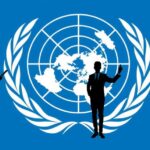Nigeria Advocates for Permanent UN Security Council Seat and Debt Cancellation
During the 79th Session of the UN General Assembly, Nigeria’s Vice President Kashim Shettima advocated for a permanent UN Security Council seat for African nations and the cancellation of Nigeria’s international debt. He called for reform in the Security Council structure, emphasizing the need for African representation, and denounced unconstitutional government changes in several West African nations.
Nigeria’s Vice President, Kashim Shettima, expressed strong advocacy for a permanent seat for African nations on the United Nations Security Council during his address at the 79th Session of the UN General Assembly in New York City on September 24, 2024. He emphasized the necessity of expanding the Security Council, currently composed of five permanent members: the United States, the United Kingdom, France, Russia, and China, each possessing veto power over resolutions. Shettima represented Nigerian President Bola Tinubu and asserted that Africa deserves representation among the permanent members, accompanied by commensurate rights and responsibilities, including veto power. Concurrently, Nigeria’s Foreign Minister, Yusuf Tuggar, reiterated this sentiment, stating, “Nigeria needs to be in that security council as a permanent member.” The demand for expanded representation comes amid ongoing discussions regarding reform within the Security Council, particularly concerning African nations. Earlier this month, the US Ambassador to the UN, Linda Thomas-Greenfield, indicated support for the creation of two additional permanent seats for African countries; however, she clarified that these new members would not hold veto authority. Additionally, Vice President Shettima called for reforms in the international financial system, specifically urging for the cancellation of Nigeria’s debts to multilateral institutions. He posited that nationalism and self-interest are hindering global cooperation on significant issues, such as terrorism, inequality, poverty, and climate change. He appealed to UN member states to reaffirm their commitment to multilateralism to enhance the operational efficacy of the United Nations. In his address, Shettima also condemned unconstitutional governmental changes in several African nations, referring to recent coups in Niger, Mali, and Burkina Faso that have destabilized the region. He cautioned that democracy is inherently fragile without the support of peace, security, and economic stability.
The discussion surrounding Africa’s representation in the United Nations Security Council has gained momentum, particularly as the continent advocates for a more significant role in global governance. Currently, the Security Council comprises five permanent members who wield considerable influence over international security decisions through their veto power. As African nations face challenges such as political instability and economic difficulties, leaders are calling for structural reforms that would enhance their agency and ability to address regional issues effectively. The push for debt cancellation reflects ongoing discussions about economic justice and equitable international relations, further advocating for a reformed global financial system that prioritizes the needs of developing nations.
In conclusion, Nigeria’s call for a permanent seat on the UN Security Council for African nations, alongside the cancellation of national debts, marks a critical step towards enhancing Africa’s role in global governance. The Vice President’s remarks reflect a broader sentiment among African leaders advocating for meaningful representation and reform in international systems that address vital global challenges. To sustain democracy and foster development on the continent, there is an urgent need for collaborative efforts and a renewed commitment to multilateral engagement among UN member states.
Original Source: www.seychellesnewsagency.com







Post Comment